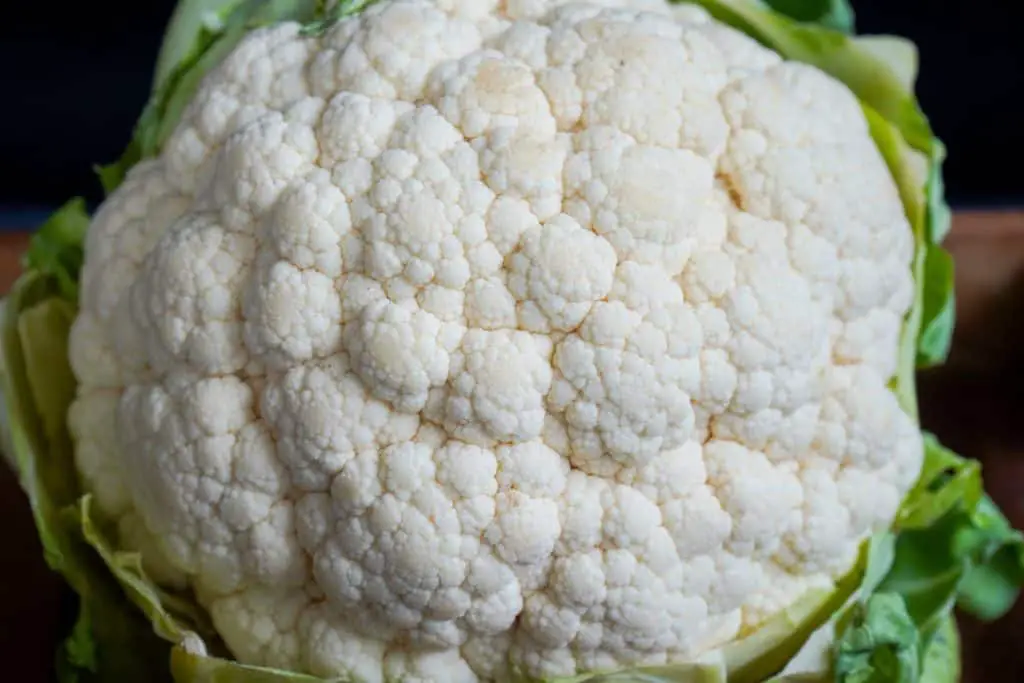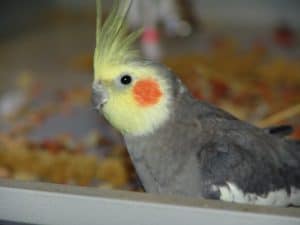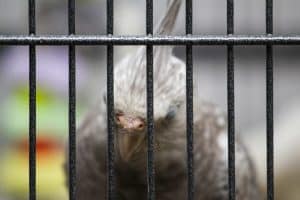You may be wondering if a cockatiel gets tired of his pellets and wants to try something new and exciting while hanging out with him, so you’ll soon discover the answer to the question – Can cockatiels eat cauliflower?
Can Cockatiels Eat Cauliflower?
They definitely can. Cockatiels can consume healthy fruits and vegetables like beets, carrots, and cabbage. Cauliflower, broccoli, and, of course, cabbage are examples of these foods. Zucchini, spinach, and asparagus are among their favorites as well as sweet potatoes.
Okay, so you know that cockatiels can eat cauliflower now. Do you understand, though, why you should offer your cockatiel cauliflower on a regular basis? Continue reading to learn more about cauliflower and other foods that are beneficial to your Cockatiel’s health!
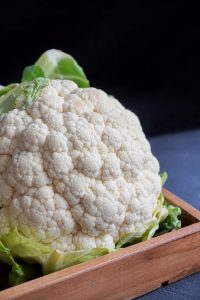
Why You Should Feed Your Cockatiel Cauliflower (And Other Foods)
1. Nutritional Benefits: Cauliflower is a nutrient-dense vegetable that is high in essential vitamins and minerals. It is a good source of fiber, vitamin C, vitamin K, B vitamins, and antioxidants. Feeding your cockatiel cauliflower can provide a wide range of nutrients, ensuring a healthy and balanced diet for your pet.
2. Low-Calorie Treat: Cauliflower is low in calories, making it an excellent treat for birds that need to maintain a healthy weight or are on a calorie-restricted diet.
3. Promotes Digestive Health: The fiber in cauliflower can aid in your cockatiel’s digestion, helping to regulate bowel movements and prevent constipation.
4. Helps Support a Strong Immune System: Cauliflower is rich in antioxidants and vitamins that can help support your cockatiel’s immune system, keeping them healthy and reducing the risk of illness.
5. Boosts Brain Health: The presence of antioxidants and other nutrients in cauliflower can help to protect the brain from damage caused by free radicals, supporting cognitive function and overall brain health.
6. Supports Bone Health: The vitamin K and calcium found in cauliflower can help to maintain strong, healthy bones in your cockatiel, reducing the risk of fractures and other bone-related issues.
7. Encourages Natural Foraging Behavior: Providing your cockatiel with a variety of fresh fruits and vegetables, like cauliflower, allows them to engage their natural foraging instincts, providing both mental stimulation and physical exercise.
8. Improves Feather Health: The array of vitamins and minerals in cauliflower can help to promote healthy and vibrant feather growth, ensuring your cockatiel always looks its best.
9. Easy to Include in Your Bird’s Diet: Cauliflower can easily be incorporated into your cockatiel’s diet by adding small pieces of the vegetable to their regular feed or offering it as a separate treat.
10. Adds Variety to Your Bird’s Diet: Including different fruits, vegetables, and other food items in your cockatiel’s diet can help to prevent boredom and ensure they receive all necessary nutrients for optimal health. Cauliflower is just one option to introduce variety and balance to your feathered friend’s meals.
Possible Problems When Giving Cockatiels Cauliflower
There are no issues with cockatiels eating cauliflower if they’re fed little, manageable tidbits. It’s essential to note, however, that 60 percent of your bird’s diet should come from those healthful pellets you buy at a pet shop or favorite store. The other 40% can be filled out with healthful foods like fruits, vegetables, grains, and beans as previously discussed.
Cockatiels can also be given tiny chunks of hard cheese, but only as a rare treat. Fish is a good source of protein, but it should be fed in moderation. When too much of a wonderful thing occurs, all bets are off. If you overdo it with cauliflower, you might induce gas. Cauliflower is a cruciferous vegetable that contains complex carbohydrates that do not break down as readily as other carbs during digestion.
Therefore, gas and bloating would be uncomfortable for a cockatiel.
Logically, the only problem with feeding your cockatiel cauliflower would occur if you were attempting to use it as your bird’s primary diet. Your bird wouldn’t get the proper nutrients and he would likely lack the energy to clean himself, sing, or interact with you. Consequently, he probably wouldn’t feel good overall.
Let’s also look at what foods are considered toxic to cockatiels and should be avoided.
- Caffeine
- Candy
- Rhubarb
- Alcohol
- Garlic
- Chocolate
- Honey
You should also avoid high-sugar, fat, and salt meals.
Can Cockatiels Eat Cauliflower? How Should I Prepare It?
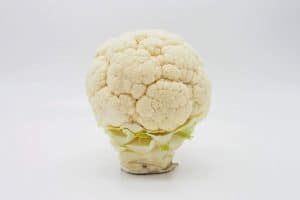
You may feed your cockatiel raw cauliflower, however, you should make sure the vegetable is properly cooked for them. Cauliflower should be chopped into tiny pieces that are easy for your avian companion to consume without risk of choking or damaging their intestines. Serve the cauliflower in small portions with other foods to create a balanced diet.
How Often Should I Feed My Cockatiel Cauliflower?
Although cauliflower is excellent for your cockatiel, it cannot survive on this alone and needs other food sources to stay healthy. In fact, all vegetables should only amount to 25 percent of their daily diet maximum.
Make sure your cockatiel is getting all the nutrients they need by feeding them a variety of vegetables, including but not limited to sprouts, spinach, turnip greens, Swiss chard, mustard greens, broccoli, escarole chicory, dried tomatoes, beet greens, bok choy, grated carrots, collard greens, corn on the cob, endive, kale, yams, and pumpkin.
What Else Cockatiels Enjoy Consuming
As you might have guessed, these birds enjoy healthy snacks like fruit, vegetables, and leafy greens. By eating these foods, they probably feel like they are in the wild. They might even like dehydrated veggies.
You should also insert a cuttlebone into the cage so that your cockatiel can play with it and keep his beak healthy. Most parrots enjoy playing with cuttlebones, as it satisfies their preening instinct while providing them with important nutrients like calcium.
It is important to offer your bird fresh, natural food whenever possible. Cockatiels can consume too much and become obese, which can lead to health problems like diabetes or lethargy.
A cockatiel needs to consume about 15 grams of food daily. Baby cockatiels will eat approximately every four hours during their second week after hatching. They can last for 8 hours without food overnight, but it is essential that breeders do not overfeed these chicks; 4-6 milliliters of food per feeding should be sufficient when they are this age.
What Vegetables Can Cockatiels Eat?
Seeds and pellets make up the bulk of a bird’s diet, but they can also eat vegetables. On alternate days, offer leafy, dark greens to your birds. Fruits like apples, bananas, and melons are also great sources of Vitamin C. Serve them to your bird in tiny portions.
Can Birds Eat Cauliflower?
Yes. When birds are in the wild, they consume a wide range of vegetables, so it’s only natural that companion pet birds would do the same. The next time you have some broccoli, cauliflower, or dark leafy greens on hand, offer them to your pet – just make sure to wash them well first.
The answer to Can Cockatiels Eat Cauliflower is?
In conclusion, cockatiels can consume cauliflower, however, owners should check to ensure that it is clean and chopped into tiny pieces.
What Plants are Toxic to Cockatiels?
- Can a Cockatiel be Constipated?
- Can a Cockatiel be kept outside?
- Can a Cockatiel Be Left Alone for a Weekend?
- Can a Cockatiel Be Potty Trained?
- Can a Cockatiel Eat Too Much Millet?
- Can a Cockatiel Fly Without Tail Feathers?
- Can a Cockatoo Live With a Cockatiel?
- Can an Old Cockatiel be Tamed?
- Can Birds Catch Human Colds?
- Can Birds Walk Backwards?
- Can Cockatiels Change Color?
- Can Cockatiels Drink Coconut Water?
- Can Cockatiels Drink Coffee?
- Can Cockatiels Drink Milk?
- Can Cockatiels Drink Tea?
- Can Cockatiels Eat Alfalfa Sprouts?
- Can Cockatiels Eat Almonds?
- Can Cockatiels Eat Aloe Vera?
- Can Cockatiels Eat Apples?
- Can Cockatiels Eat Apricots?
- Can Cockatiels Eat Arugula?
- Can Cockatiels Eat Asparagus?
- Can Cockatiels Eat Avocado?
- Can Cockatiels Eat Bacon?
- Can Cockatiels Eat Banana?
- Can Cockatiels Eat Basil?
- Can Cockatiels Eat Bean Sprouts?
- Can Cockatiels Eat Beetroot?
- Can Cockatiels Eat Bell Peppers?
- Can Cockatiels Eat Blackberries?
- Can Cockatiels Eat Blueberries?
- Can Cockatiels Eat Bread?
- Can Cockatiels Eat Broccoli?
- Can Cockatiels Eat Brussel Sprouts?
- Can Cockatiels Eat Budgie Food?
- Can Cockatiels Eat Cabbage?
- Can Cockatiels Eat Cantaloupe?
- Can Cockatiels Eat Carrots?
- Can Cockatiels Eat Cashews?
- Can Cockatiels Eat Cauliflower?
- Can Cockatiels Eat Celery?
- Can Cockatiels Eat Cheerios?
- Can Cockatiels Eat Cheese?
- Can Cockatiels Eat Cherries?
- Can Cockatiels Eat Chia Seeds?
- Can Cockatiels Eat Chicken?
- Can Cockatiels Eat Chickpeas?
- Can Cockatiels Eat Chocolate?
- Can Cockatiels Eat Cilantro?
- Can Cockatiels Eat Cinnamon?
- Can Cockatiels Eat Clover?
- Can Cockatiels Eat Coconut?
- Can Cockatiels Eat Corn?
- Can Cockatiels Eat Crackers?
- Can Cockatiels Eat Cucumbers?
- Can Cockatiels Eat Dandelion Leaves?
- Can Cockatiels Eat Dates?
- Can Cockatiels Eat Dill?
- Can Cockatiels Eat Dog Food?
- Can Cockatiels Eat Dragon Fruit?
- Can Cockatiels Eat Dried Cranberries?
- Can Cockatiels Eat Eggplant?
- Can Cockatiels Eat Eggs?
- Can Cockatiels Eat Eucalyptus Leaves?
- Can Cockatiels Eat Fennel?
- Can Cockatiels Eat Figs?
- Can Cockatiels Eat Fish?
- Can Cockatiels Eat Flax Seeds?
- Can Cockatiels Eat Flowers?
- Can Cockatiels Eat French Fries?
- Can Cockatiels Eat Garlic?
- Can Cockatiels Eat Ginger?
- Can Cockatiels Eat Grapefruit?
- Can Cockatiels Eat Grapes?
- Can Cockatiels Eat Grass?
- Can Cockatiels Eat Green Beans?
- Can Cockatiels Eat Guava?
- Can Cockatiels Eat Hazelnuts?
- Can Cockatiels Eat Honey?
- Can Cockatiels Eat Ice Cream?
- Can Cockatiels Eat Jackfruit?
- Can Cockatiels Eat Jalapenos?
- Can Cockatiels Eat Kale?
- Can Cockatiels Eat Kidney Beans?
- Can Cockatiels Eat Kiwi?
- Can Cockatiels Eat Lavender?
- Can Cockatiels Eat Leeks?
- Can Cockatiels Eat Lemon?
- Can Cockatiels Eat Lemongrass?
- Can Cockatiels Eat Lentils?
- Can Cockatiels Eat Lettuce?
- Can Cockatiels Eat Lychees?
- Can Cockatiels Eat Macadamia Nuts?
- Can Cockatiels Eat Mandarins?
- Can Cockatiels Eat Mango?
- Can Cockatiels Eat Mealworms?
- Can Cockatiels Eat Meat?
- Can Cockatiels Eat Mint?
- Can Cockatiels Eat Mushrooms?
- Can Cockatiels Eat Newspaper?
- Can Cockatiels Eat Noodles?
- Can Cockatiels Eat Nuts?
- Can Cockatiels Eat Oats?
- Can Cockatiels Eat Olives?
- Can Cockatiels Eat Onions?
- Can Cockatiels Eat Oranges?
- Can Cockatiels Eat Papaya?
- Can Cockatiels Eat Parakeet Food?
- Can Cockatiels Eat Parsley?
- Can Cockatiels Eat Pasta?
- Can Cockatiels Eat Peanut Butter?
- Can Cockatiels Eat Peanuts?
- Can Cockatiels Eat Pears?
- Can Cockatiels Eat Peas?
- Can Cockatiels Eat Pecans?
- Can Cockatiels Eat Pineapple?
- Can Cockatiels Eat Pistachios?
- Can Cockatiels Eat Pomegranate?
- Can Cockatiels Eat Popcorn?
- Can Cockatiels Eat Potato Chips?
- Can Cockatiels Eat Potatoes?
- Can Cockatiels Eat Pretzels?
- Can Cockatiels Eat Pumpkin Seeds?
- Can Cockatiels Eat Pumpkin?
- Can Cockatiels Eat Quinoa?
- Can Cockatiels Eat Radishes?
- Can Cockatiels Eat Raisins?
- Can Cockatiels Eat Raspberries?
- Can Cockatiels Eat Rice Cakes?
- Can Cockatiels Eat Rice?
- Can Cockatiels Eat Salmon?
- Can Cockatiels Eat Scrambled Eggs?
- Can Cockatiels Eat Sesame Seeds?
- Can Cockatiels Eat Snow Peas?
- Can Cockatiels Eat Spinach?
- Can Cockatiels Eat Strawberries?
- Can Cockatiels Eat Sunflower Seeds?
- Can Cockatiels Eat Sweet Potato?
- Can Cockatiels Eat Thistles?
- Can Cockatiels Eat Tomatoes?
- Can Cockatiels Eat Tortilla Chips?
- Can Cockatiels Eat Tortillas?
- Can Cockatiels Eat Tuna?
- Can Cockatiels Eat Turkey?
- Can Cockatiels Eat Walnuts?
- Can Cockatiels Eat Watermelon?
- Can Cockatiels Eat Weetbix?
- Can Cockatiels Eat Wild Bird Seed?
- Can Cockatiels Eat Yogurt?
- Can Cockatiels Eat Zucchini?
- Can Cockatiels Get Fleas
- Can Cockatiels Get Hiccups
- Can Cockatiels Sleep With Noise
- Can Cockatiels Survive In Cold Weather
- Can Cockatiels Swim
- Can Cockatiels Talk How To Get Your Cockatiels Talking
- Can Cockatiels Talk
- Can Cockatiels Wear A Harness
- Can Cockatiels Wear Diapers
- Can You Be Allergic To Cockatiels
